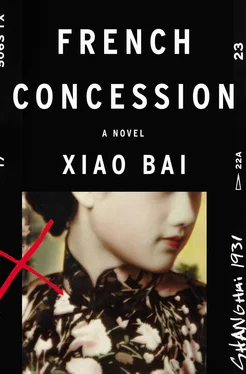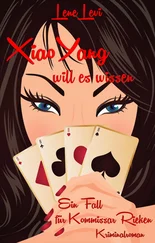When he turned, his dick flopped over like a worm. She reached out to touch it, and it became hard before he even awoke.
His voice came from near her feet, sputtering as though it was bubbling up from somewhere near the muddy bottom of the Whampoa.
“Tell me, tell me, do those wicked friends of yours do this to you?” She caught his head between her knees, as if she could capture that brain of his that constantly distracted her. She wanted to rub the wet sponge of her body against the bridge of his nose. She refused to stop and listen to him. If he was jealous — well, let him be.
Half an hour later, she thought about the “wicked friends” he had mentioned. Did he think she was having sex with Zung? Then he was mistaken. All this time she had resisted Hsueh. He wanted to unsettle her, and the more she resisted, the more deeply he seemed to penetrate her. She could not force herself to like him any less, but she was afraid of leading him on. She did not want to disappoint him. Recently she had found herself mellowing with age, becoming reluctant to let go of things that made her happy. She was afraid of loss, and happiness no longer seemed to lie within easy reach. She had come to see that happiness for her consisted of a certain inward thrill.
“He’s not a wicked man. He’s just my business partner,” she explained.
“What kind of business?” As he leaped off the bed, his spinal dimple was visible and bruised all over.
“It’s not important,” she said angrily. “It’s none of your business. It wouldn’t do you any good.”
“I want to know all about you! I have drinks with you, sleep with you, and travel with you. But you make me feel like a gigolo — I don’t know what you’re doing or where you’re going, and you always slip out of the room when I’m asleep.”
He had started shouting. “I don’t even know where you live or the line of business you’re in. What’s the gun for, buying emeralds?”
“I told you, that isn’t an emerald, it’s a garnet stone from the Urals.”
He reached into her handbag for her cigarette case and tipped out its contents. The cigarette case, a pistol, and a pale blue sheet of paper fell onto the wet sheets — a blueprint for a machine gun that looked not unlike an elaborate clotheshorse. A present from Sir Morholt, who had cut it out carefully and entrusted it to her in a bar in Hong Kong.
She snatched it up along with her gun and stuffed it back in her handbag. Glaring at him, she thought of the kick she had given him on the ship. She thought about how much she liked everything about him.
“Okay, a garnet stone. That doesn’t call for a gun.” Lighting a cigarette, he handed it to her.
“Maybe one day you can come with me to see him, but not now. I’ll tell you more about my business some other time. But you’ll have to behave. Don’t ask questions. Don’t talk too much.”
She had reached her hand between her legs and was playing with his dick, kissing his nose and ears. Her mouth tasted of smoke. Now his body smelled of her body. Defeated, he collapsed onto the pillow, and the bruise on his shoulders made him gasp in pain. She stroked his bruises and the scars on his neck.
It was past midnight, which meant it was Saturday, and they were about to spend the whole day in that room.
“Now, tell me who did this to you?”
JUNE 7, YEAR 20 OF THE REPUBLIC.
7:15 P.M.

The restaurant was called Bendigo. It lay on the corner between Route Cardinal Mercier and Rue Bourgeat, on the ground floor of the Cathay Mansions. The window seat in the northwest corner faced the French Club and Lyceum Theater across the road. It was the best Western restaurant in Shanghai, and it was owned by a Jewish couple.
The steps behind a set of glass doors led down to the restaurant. Its semibasement had not been constructed according to any particular architectural style, or to prevent lowland dampness, or to keep servants from being distracted by goings-on outside. Rather, the contractor in charge of building the foundations had chosen the cheapest steel bars he could find, causing the entire building to begin sinking into the ground not long after it had been built.
The owner of the restaurant was a German Jew whose portrait hung on the wall by the steps leading to the restaurant. He used to have a magnificent beard, which made him look like Karl Marx in one of the posters that used to hang on every street corner, but he had shaved it off when he opened a restaurant. He was a legendary figure, and there were many stories about him. For instance, it was said that he had made the first rent payments on the restaurant using money he made as a young man panning gold in Australia — didn’t the name Bendigo suggest as much?
But longtime residents of the Concession could tell you a different story. More than twenty years ago, old Romantz had been a penniless Jewish tramp who did not have so much as a suitcase to call his own. It was said that every one of the wretched foreigners who arrived in Shanghai traveling below deck in great ships came ashore with a couple of tattered trunks, but that wasn’t true. Romantz had been pacing along the Whampoa, close to despair, when Fate thought of him, and a large wallet fell from a rickshaw. A chance like that is what you make of it. If Romantz had kept the wallet, it might have paid for a couple weeks’ worth of beer. Instead he snatched up the wallet and dashed after the rickshaw, and things turned out very differently.
The owner of the wallet was the old captain who managed Astor House Hotel. He was so impressed by Romantz’s honesty that he offered him a job on the spot. Romantz spent twelve years at the hotel as a steward, in charge of the silver cutlery and French porcelain. After ten years, Fate thought of him again, and this time she sent him a wife. Mrs. Romantz was a Russian Jewish woman who kept rooms in the hotel to entertain single foreign men. Finding that Romantz could be as attentive to her as he was careful with the captain’s French porcelain, she agreed to marry him. They decided to marry in secret, outside the synagogue, because as long as they did not declare their marriage before the Lord, Mrs. Romantz could continue pursuing her lucrative profession. They would tell Him when they had scrimped and saved enough money for the restaurant. Sure enough, on the very same day Bendigo opened, they had a proper Jewish wedding at the synagogue.
Romantz was a legend. Perhaps because the Concession was something of a floating city, rootless, without a past and with no guarantee of a future, it functioned like a huge vat of dye that tinted all its characters with the quality of timelessness, which turned them into legends.
But Zung had not come to Bendigo to listen to Concession stories. He was neither a journalist nor a tourist, and besides, he had heard them all before. He was meeting someone here. It was Sunday, and the restaurant was almost empty.
His rooms were in the Oriental Hotel, facing No. 5 Horse Road, opposite the bright lights of Ch’ün-yü Alley. The main door of the hotel opened northwest onto Yuyaching Road, as if its architect had hoped that the wealth of the Race Course would rub off on it. Zung had to sign himself into the hotel guest book using a Chinese name, so he called himself Ch’en Ku-yüeh. Of the fountain pen and calligraphy brush provided, he chose the brush and signed his name in excessively florid cursive, an honest form of dishonesty. He presented neither the proof of residence issued by the colonial Hong Kong government to Ch’en Chi-shih, nor the travel authorization granted by the Hanoi Police to Mr. Paul Ch’en. The Municipal Police required all hotels to record the names of guests, but few hotels did so.
Читать дальше













